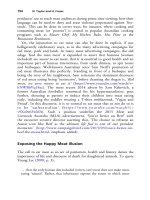The palgrave international handbook of a 19
Bạn đang xem bản rút gọn của tài liệu. Xem và tải ngay bản đầy đủ của tài liệu tại đây (25.5 KB, 1 trang )
6
J. Maher et al.
defining animal abuse and by the absence of reliable research and appropriate remedies. Moreover, while recent attention to animal abuse has
raised awareness and concern about its impact on humans, its effects on
animals have received far less attention.
Thinking about animal abuse requires one to begin with and confront
century-old issues in criminology about whether crime or harm should be the
focus of study (criminology versus zemiology, that is). For our purposes, it
matters little whether animal abuse is legal or illegal, intentional or unintentional, commonplace or infrequent, committed one-on-one or in large-scale
institutions. However defined, all forms of animal abuse should be opened
up for nonspeciesist scrutiny. This broader and deeper vision has already
happened with other major forms of interpersonal and institutional violence
such as sexism, racism and ageism. Criminology may have arrived late at the
scene. But, as this book shows, it has arrived.
The Contents of This Book
This book was designed to fill three needs: (1) the need for an inclusive
resource which would introduce the key concepts and issues in animal
abuse studies; (2) the need for a research-based volume which would
invite scholars, students and practitioners to think about a comprehensive range of animal abuse scenarios; and (3) the need for a useful
platform for scholars of animal abuse to raise awareness of their own
areas of expertise.
The central theme of the book is the use and abuse of animals. The wide
range of human-animal relationships examined in the following 22 chapters
include animals who live in close proximity to us (those whom we have
domesticated and who live in our homes or those who are raised on farms
and whom we slaughter as edibles); those animals collected and destroyed in
‘the wild’; those animals whom we enlist as items of entertainment and sport;
those animals sacrificed on the scientific altars of human health, human
knowledge and human happiness; and those animals used and abused by
political and military elites for our protection and by national and local states
who decide certain animals are unwanted, dangerous, surplus to demand and
otherwise expendable.
While we wish to consider animal abuse in its broadest sense and we
recognise that all animal species are adversely affected by commonplace
human behaviour, there is, inevitably, some bias in the Handbook’s chapters
in respect of what species are represented and what are ignored. There is a









